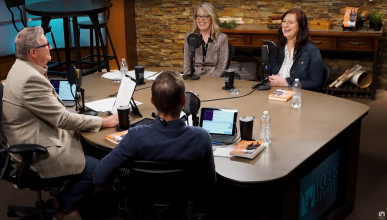Preview:
John Fuller: If you find yourself somewhere around the midpoint of life, uh, how’s it going? Do you feel like you’re on track with your goals or are you still playing catch up or maybe you’re considering some important changes to life? Uh, wherever you may be in that journey, we want to explore what life is like in the middle years on today’s episode of Focus on the Family. Thanks for joining us. Your host is Focus president and author Jim Daly, and I’m John Fuller.
End of Preview
Jim Daly: John, I think I’m still trying to wrap my head around what is the middle life, the middle years?
John: There’s no chronological definition.
Jim: (Laughs).
John: I think it’s… I’ve said it’s when you send kids to college, then you qualify for middle age.
Jim: Is that right?
John: What do you think?
Jim: I don’t know. I- I don’t know if it’s chronological like 40 to 60 sounds pretty much like the middle. I don’t know. We’ll ask our guests when we get a chance.
John: All right.
Jim: But the one thing is I love this idea our guest has, uh, written in her book, The Middle Matters, this idea of assessing where you’re at, what’s working, what’s not working. And maybe we’ll be mature enough to say we gotta make some changes on the things that aren’t working.
John: Yeah. And we’ve all seen train wrecks where people are having kind of a midlife crisis, right? I mean the stereotypes for that. Um, we’re gonna get beyond that though and think through scripturally, what does it mean to be in these middle years. And we have Lisa-Jo Baker back with us. She’s an author, speaker and podcast host. Uh, she has a real gift of encouragement and, uh, especially for women and some good insight for men as well of course. Uh, she’s written that’s the basis for our conversation called The Middle Matters, Jim, you referenced it. Uh, the subtitle is Why That (Extra)Ordinary Life Looks Really Good on You.
Jim: (Laughs).
John: And we’ve got copies of that here at the ministry. Just stop by focusonthefamily.com/broadcast or give us a call.
Jim: Lisa-Jo, welcome to Focus again.
Lisa-Jo Baker: I’m so happy to be back.
Jim: It’s great. And of course, Jean is merely a teenager, but I thought (laughing) she could give us some, you know, insights on midlife.
Jean Daly: Barely in the middle years.
Jim: I’m surprised I even thought of this. (Laughing).
Jean: Very good.
Jim: It’s so good to have you too.
Jean: Well, it’s always a pleasure being here.
Jim: It’s so much fun. Uh, Lisa-Jo, let’s ask that question. What is the definition of the midlife, the middle years? Who- who are we?
Lisa-Jo: I- I’m guessing it depends on who you ask, right? So I think it could be by age, but it could just be by stage. I’ve had women that are in their late twenties tell me, “I feel like I’m in midlife right now just because I have kids that are so much older, that are going into high school or college.” And then there are moms who started later in life and so they might be in their forties by the time their kids are heading into high school or graduating high school. So I mean, I do think it’s one of those things your internal barometer, (laughs) nudges you and you get that feeling. You wake up one morning and you think to yourself, “Oh, I’m not at the beginning anymore. I’m in the middle.”
Jim: (Laughs). That’s so true. I think that hit me at 50, that feels like the middle of something. (Laughing).
John: I dunno.
Jim: Uh, well, let’s dive into your story, Lisa-Jo. Uh, you describe how in these middle years, uh, you tend to be more concerned about the comfort of your clothing rather than size.
Lisa-Jo: I know.
Jim: That’s definitely true, even for guys, right? What fits and what’s comfortable?
Lisa-Jo: Yeah. Right, right. I mean, it really hit me one morning when I was going to my closet and there are a pair of jeans I bought once upon a time in Prague. And my husband and I-
Jim: (Laughs).
Lisa-Jo: I mean, right? That tells you right there, that tells you-
Jim: Got to keep them.
Lisa-Jo: They’re not really midlife jeans. But my husband and I had taken a trip, a last trip just the two of us before we had kids and we’d gone to Prague and there was this beautiful little store I got this pair of jeans and I looked at them and I felt like the jeans were looking back at me and telling me, “There’s not a chance.” (Laughing). And I thought about those jeans, and I thought about trying to fit into them, and instead I reached for a pair of comfy sweatpants, um, or a different sized jeans. And I realized in that moment though, I wasn’t sad, I didn’t miss that version of myself. I had a- a new kind of contentment with the stage I was in now. And I think about this body that grew these three humans that live in my home now and how it has changed over the years.
Jim: (Laughs).
Lisa-Jo: And I realized I- I wouldn’t go back. I wouldn’t trade what I have now for those Prague jeans. And maybe listen, maybe one day I’m gonna wear those jeans again. I’m s- I’m not saying I’m never.
Jim: You’re betting on it. (Laughing).
Lisa-Jo: But at the same time, there’s just a sense of peace with this age and stage I am now. You know those jeans represent me before I had kids, before I knew what it was like to deal with difficult teenagers, before I’d been married 20 years. So I love those jeans, they tell a love story, but my sweatpants tell a whole different kind of love story. (Laughing).
Jim: Jean, are you relating to this?
Jean: Absolutely. I absolutely.
Jim: (Laughing).
Jean: Every pair of pants I own right now don’t have a real zipper, they’re just stretchy.
Lisa-Jo: Oh. (Laughing).
Jean: Stretchy.
John: It’s practical. Nothing will break, right?
Jim: Somebody came up with a great idea. (Laughing). Man, forget that. Lisa-Jo, you struggled with the idea of feeling beautiful as a woman since you were a teenager. Some people are probably hearing an accent, you’re from South Africa.
Lisa-Jo: Mm-hmm.
Jim: So speak to that struggle. And so many women,
Lisa-Jo: Right.
Jim: uh who have that similar struggle.
Lisa-Jo: Sure. Because there’s all these messages bombarding us from culture about what beauty means, what beauty looks like, there’s this one standard of beauty. And I have a daughter, and so after two sons and having a daughter, it suddenly became really important to me to figure out like, what do I do about this whole beauty conversation? And I wonder if in childhood all lot of us, Jean, I’d be interested if you’ve had an experience like this. But when we’re little, when we’re twins or teens, we can be shaped by the things people say to us. And I remember being 16 and driving in the car with my mom, and it was the season of Miss South Africa, you know? And I remember telling our mom, “One day I am gonna be Miss South Africa.” And she looked over at me with just tenderness and the love of a mom and then said words I wish she could take back. (Laughs).
Jim: Right.
Lisa-Jo: She said, “Oh my darling. I think you’re beautiful, just not in that way.”
Jim: Ooh.
Jean: Oh.
Lisa-Jo: Yeah, right. Like what a zinger? So that stays with you, and it starts to define part of who you are. And having a daughter now, what I’ve realized is important is that beauty is- is in the eye of the heavenly beholder. Like God names everything that he made good. And he talks about everything being beautiful in Ecclesiastes. And I now as a mom of a daughter, I remember a moment where when she was a toddler, she was talking about her little tummy. You know how toddlers have like a little chubby belly?
Jean: (Laughs). Yes.
Lisa-Jo: And she was really worried and concerned about it. And I took her outside and we have these giant oak trees in our yard and they’re hundreds of years old, but they start with a tiny, chubby little acorn, right? And I showed her the acorn and I said, “This is what your belly is like. Everything God knows that you need to grow is packed into you. And he is gonna stretch it up and grow you into one of these big trees. And none of these trees, I promise you, leans over and whispers to another tree, ‘You know, do these pants make me look X, Y, Z? Like, how do- what do you think of this bark? Like am I okay?’ No, these trees are mighty and beautiful, and they give a shade and they’ve lived hundreds of years and they tell long stories about weathering storms.” And so now when I think about beauty, I define it differently. I mean, sure, there are parts of us looking in the mirror that we want to feel comfortable and beautiful, but strength, kindness, joy, courage, faithfulness, all of these are elements of beauty that are packed into that little acorn that we grow out of.
Jim: That’s a great analogy.
Jean: Yup, yes.
Jim: Yeah, no, that’s really good. What a great way to explain it to a young person especially. Jean, what about that? I know that, um, the teen years, that can be tough on girls, especially girls you grew up in Southern California. I mean, it was all about looking perfect, right?
Jean: Absolutely, yes. I think you get those messages even those of us who didn’t grow up with social media that yes, you know who are the- the prettiest girls at school. And- and when I was growing up, thin lips were- were popular, were in.
Lisa-Jo: Isn’t it funny the things that change over the years?
Jean: Yes. And I had- I had the same size of lips when I was six years old.
Jim: (Laughs).
Jean: So they were big at the time. And I can remember standing in the milk line.
Lisa-Jo: Huh.
Jean: In elementary school and a girl in front of me didn’t know I was behind her and said, “Oh yeah, Jean and Linda have huge lips.” And I… So then I… my sixth-grade picture, I smiled, I got my lips really tiny.
Lisa-Jo: (Laughing). So horrible, yes.
Jean: But those things, you know, they- they do s-
Lisa-Jo: They stick.
Jean: They stick.
Jim: Well, I’m glad you have lips the way you do.
Lisa-Jo: (Laughs).
Jim: I love your lips. (Laughs).
Jean: Thank you.
Jim: Let me ask you too, you had this exchange. And again, a lot of this goes to body image, which has captivated so many young people, so many young girls, and that’s why we’re spending a few moments on it here. But you had that experience with your dad, and you were gonna see him and you hadn’t seen him in a while.
Lisa-Jo: Right.
Jim: It was his 70th birthday, I think.
Lisa-Jo: Right.
Jim: And it seemed like in the book you mentioned your first thoughts were about your weight and he’s-
Lisa-Jo: I know and how sad is it that having not seen him in so long, that’s what I would be worried about. It’s so ridiculous.
Jim: I mean, I- I think it’s common.
Lisa-Jo: Yeah. And I had, you know, part of it is my dad’s a doctor, he’s very health conscious, he, you know, takes fitness and exercise seriously. And I felt like I’m just gonna prepare him that we’re just a little fluffier around the edges, you know? We are carrying some of our stress in our genes. (Laughs). And um, so I called him, and I just was like kind of try to ease into mentioning that we’re coming home a little heavier than- than we wish we were. And it was the most beautiful reaction. It really was sort of the antidote to how my mom had responded with my beauty pageant question. He said to me in his beautiful South African British accent, “Oh my darling, no, just come home. The more of you, the better. We can’t wait to hug you and hold you. And really the whole time you’re here, we really intend to put a few more pounds on because we’ve got all your favorite foods planned.” You know?
Jim: (Laughing).
Jean: Aww.
Lisa-Jo: And it just, I hope people listening are- are not hearing me talk about, this is not a conversation about healthy eating or exercise per se, it’s really about healthy viewing of ourselves and-
Jean: Beautiful.
Lisa-Jo: When you are viewed through the- the lens of love like that, which is really how God sees us too, I think and you feel so lovable, it changes how you look at yourself in the mirror. And so when I look at the pictures from that trip home, I just see joy, I see delight, I see family.
Jean: That’s beautiful.
Jim: It is. And it’s a great way to see yourself. Okay, we’ve kind of looked at the self-image of how we view ourselves and those things that hurt, whether it’s about your lips or your weight or whatever it might be. I remember a guy in high school, I was a ninth grader, he was probably 11th grader, I’ve mentioned this before. He was a big dude, a swimmer. And he turned around in PE class and just hit me right in the sternum to the point where it cracked.
Lisa-Jo: Oh.
Jim: And he goes, to his friend, he goes, “See this- this kid hasn’t filled out yet like us.” And I’m sitting there wheezing, you know, about to die. And I’m going, “Thank you for making me your example.”
Lisa-Jo: Ouch. (Laughs).
Jim: But it- it happens in that way with the boys, you know, physique and, you know, are you buff and built out?
Lisa-Jo: Yeah.
John: And somehow all those feelings follow us all the way through life.
Jim: Oh, yeah.
Lisa-Jo: Right.
Jean: Yes.
Jim: Lisa-Jo another issue that you mentioned in the book, and this is a little corner turn here, but it’s about marriage. And you know, we read articles where midlife can take a toll on marriage. Um, you’ve raised the kids, you’re raising the kids and they’re kind of toward the end. And you’re both looking up going, “Who are you?”
Lisa-Jo: Right.
Jim: And you know, it’s unfortunately one of the asked us areas of divorce. So when you start to think about feeding your marriage and taking care and tending to your marriage, when you’re in that midlife zone, how do you approach your relationship with Pete, your husband?
Lisa-Jo: Well, maybe I’ll begin by saying I had read an article in the Huffington Post that I think is sort of a segue between body image and midlife of marriage because it was the teenager quote of the week. And this is what the quote was. My life will never be complete until someone has run through an airport to stop me getting on a plane, right? Which is this trope from all the romcoms.
Jean: Yes.
Jim: Right.
Jean: Yes.
Lisa-Jo: You could never do today anyway because TSA would never allow that.
Jim: Yes.
Jean: (Laughing).
John: Or get tackled by police before that happens.
Lisa-Jo: But I understand it, right? It ties into all these ideas we have about how we’re supposed to look or how we’re supposed to be loved. And I remember reading that and thinking, “No.” Just period, full stop, no. That cannot be the end of the story, because the problem is with movies is after that moment, the credits roll, right? And you go back to your real life where real love you forget actually lives. Because after the guy ran through the airport, they have to live 20 years together or 30, 40, 50 years.
Jim: (Laughs).
Jean: That’s right.
Lisa-Jo: And of 50 years of him throwing his socks on the side of the bed every night.
Jean: (Laughs).
Lisa-Jo: Like where’s that love story? And so I remembered writing and thinking about this idea about love in the middle, like that’s the real love. Like the love stories that are the beginnings, they’ll- they’re fleeting, they’re gone in like a heartbeat. But then you’ve got 50 years. Where are the love stories in the trenches? And so for me, it has really been having eyes to see what love looks like there. I mean there, the love story is my husband who chooses to drive the minivan in the heat of summer with the broken air conditioning for me, you know. Or the guy who says, “Uh, don’t worry, I’ll go out at 8:30 into the late-night run and the pickups.” Or the guy who comes home, not with roses, but with like chocolate covered strawberries or, you know, uh, that kind kind of rice or bread that you like (laughing). It changes. But for me, it has been constantly this- the shifting of how we see. Because I think there’s this emphasis, you know, carpe diem, seize the day. But what if you’re too tired to do that? And what if though, it’s about a shift in seeing the day, it’s how you see the day? So it isn’t about that dash through the airport, instead, it’s the long love story of 40 years in the middle.
Jim: Yeah.
Jean: That’s good.
Jim: (Laughs).
Jean: That’s good. See the day.
Jim: Concentrate on that Jean.
Jean: Yeah.
Jim: (Laughing). I was gonna ask you though. I mean, we’re the couple here so I mean, what do you think, what in the midlife that we are completing?
Jean: Absolutely, ab- And I do… you were talking about the airport story. I… When Jim and I were first married and he started traveling, I would park the car and go inside and greet him at the gate, which you could do that then.
Lisa-Jo: Yes.
Jean: And I did that. I don’t know, you know, maybe a year or so, and then I started, you know, then-
Jim: (Laughing). It’s the evolution of your relationship, you get- you-
Jean: Right, then you just park at the curb and then you just see if he can a ride.
Lisa-Jo: Right.
Jim: You get left at the gate, then it’s the curb and then it’s, can’t you take your car?
Jean: Right. (Laughing).
John: Or- or how about, “I didn’t know you were going somewhere”?
Jim: Right. (Laughing). That’s kinda how it works.
Jean: But yes, there are seasons in marriage and it’s not a fairytale.
Lisa-Jo: Right, right.
Jean: And yet God uses it to refine us.
Lisa-Jo: Right.
John: Those are some good insights from Jean Daly and also Lisa-Jo Baker. They’re our guests today on Focus on the Family. Your host is Jim Daly, I’m John Fuller. And we’re talking about this season of, uh, the middle years and what that’s like. Uh, we have the book by Lisa-Jo Baker called The Middle Matters: Why That (Extra)Ordinary Life Looks Really Good on You. Uh, get your copy when you swing by focusonthefamily.com/broadcast or call 800, the letter A, and the word FAMILY. And this reminder that our website has a lot of great resources related to this topic as well.
Jim: It’s good. And there are so many good things there. Lisa-Jo, I don’t mean to put you on the spot, but you wrote it in your book (laughing). But I’ll lay it out there first. I remember one time, years ago Jean said to me, “You know I love you. I just don’t like you right now.”
Lisa-Jo: (Laughs).
Jim: To which I was like, “How could that be? Who- who could not like me?”
Lisa-Jo: (Laughing).
Jim: I didn’t actually say that I just thought it.
Lisa-Jo: Yes, right.
Jim: It’s terrible to think that by the way.
Lisa-Jo: (Laughs).
Jim: Uh, but in your book, you talk about right before you go on a live interview, I think Facebook live or something.
Lisa-Jo: Oh, yeah, yes.
Jim: You’re yelling at Pete.
Lisa-Jo: we had-
Jim: So I gotta… I’m gonna out you. So what was going on with you and Pete?
Lisa-Jo: We’re in a big old fight so literally like four minutes before I was supposed to go on my Christian Living Facebook live (laughing)-
Jean: How to love your husband.
Lisa-Jo: I screamed so hard at him my throat hurt afterwards. (Laughs).
John: Oh my.
Lisa-Jo: We were in the middle of a doozy of a fight. And I remember actually yelling at him, “And now I have to go on TV and be a Christian.”
Jim: (Laughing).
Lisa-Jo: Can’t believe you’re having this fight with me right now. (Laughing).
John: All his fault.
Jean: That is perfect.
Jim: (Laughing).
Lisa-Jo: Yeah. I mean, you know, one of the things the book is called The Middle Matters and the subtitle isn’t just Why That (Extra)Ordinary Life, it’s in parentheses to emphasize the extra, Why That (Extra)Ordinary Life Looks Really Good on You. And I think we take for granted the ordinary part and we forget about the extra and that God puts us in families and marriages in order to teach us things about ourselves. So I know nothing better than a marriage to help you see yourself for who you really are, for how God sees you. And I don’t mean that in any kind of self-critical way. Instead, it’s kind of a discovery of the parts in your story that maybe you hadn’t recognized need work. And that conversation that Pete and I had, I use conversation lightly (laughs), loosely, um, but it showed us a lot about how we communicate. And I think what has surprised me is you can be married to someone for 22 years like I have and still learn things about them, their origin story that have shaped how they interact with one another. And so we are big advocates for therapy and counseling. And after some great seasons of that, what we learned is that Peter tends to keep a lot of what’s happening with him in his head, and I say all my words out loud. And so the problem can become when there are things happening that I had no idea are happening with him and then he will approach the conversation as if I know. And then I have to say, “I don’t live in your head.”
Jim: (Laughs).
Lisa-Jo: Like I did not know that that was happening with you. And I say this to young married couples again, the trope from the movies is that will just intuit what it is that you need or want and show up and play music outside your door.
Jean: Yes.
Lisa-Jo: And I tell you on couples, now if you want that to happen, you will have to explain that to your husband.
Jean: Yes.
Lisa-Jo: Like my love language is gifts or acts of service, or please do X, Y, Z. So I am not kidding you when I tell you we had many fights about how I would clean the kitchen or the home and then no one would notice. And so now what Peter does even to this day with our teenage children is he walks in the house and if it has been cleaned, he stops everything and goes, “Kids, wow. Look at the house. Isn’t it awesome? Isn’t mom great? Look what she did.” ‘Cause words of affirmation in case you’re wondering my love languages.
Jim: Yeah.
Jean: Yeah. That’s great.
Jim: And you’re beaming the whole time.
Lisa-Jo: Yes. But I had to tell him that you only like 500 fights before you figure out.
Jean: Yes.
Lisa-Jo: Oh, I- I have to say words to you so you know what it is that I need to feel loved in this relationship or what you need.
Jim: Well and let me ask you this- this idea of trying to do better in some area for a performance reason like an external reason, or because it’s a healthier place to be. So not to be the Pinterest person.
Lisa-Jo: Right.
Jim: But to be the God-fearing person.
Lisa-Jo: Absolutely.
Jim: To be more comfortable with how God has made you. There should be a distinction there.
Lisa-Jo: Sure. I mean, absolutely. Yes, I really do believe a large part of our experience here on earth is creatures created in an image of God is a redemptive purpose, right? He wants to see us redeemed. He, Jesus said all the time, the kingdom of God is now. And we live in the kingdom of God here and now and he gives us opportunity after opportunity for wholeness, for healing, for redemption. And marriage is a beautiful place for that because let me just say it’s- it… when it comes coded in love, right? When it’s not a critical nitpicking, constant nagging, almost abusive picking at somebody, but when somebody really loves you and they really see you and are able to help you identify places in your life that might have ties to when you were a teenager and then gently work with you in those places, the growth and freedom is really beautiful.
Jim: You had a story about your son, Micah, your second son who struggled with reading and- and spelling. Uh, what happened there and what- what did you learn and what did he learn through that?
Lisa-Jo: Well, Jean, he’s the one who sounds like your son.
Jean: (Laughs).
Lisa-Jo: I always say he pushed his heart against me when he came out, as he still does to this day.
Jean: (Laughing).
Lisa-Jo: Wow. I mean, he is God’s refiners fire in my life. Um, he’s a very unique child, deeply passionate. And because of that, when things are difficult for him, he- he explodes, like all his feelings are everywhere. And for anyone who’s had a kid with any kind of learning disability, it’s deeply disheartening because not only are you feeling the pain for your child and you want them to succeed, you are also as a, just being honest as a parent, experiencing your own dread because you now know when spelling homework begins, it’s now gonna be like a three-hour marathon of wailing and gnashing of teeth. It was so traumatic. But we’ve often said that when we invest in our kids, what we need is a team around them. And I needed a teacher on my side. And I went and met with his teacher, and I described to her the struggles he’s having. I- I do this now every year. I write an email explaining to the teacher what we love about Micah. I want to preempt their frustration.
Jean: I like that.
Lisa-Jo: So I share here are the things that are so great about him, this is why he is gonna be your ally in class, because he’s so passionate in these areas. And so he had a teacher who finally believed in him too. And so he stopped saying, “I can never do this.” And he started saying, “I’m- I think I’m gonna do this.” And he wanted, his goal was to make honor roll. In- and order to do that, he had to not fail (laughs) English and reading and spelling.
Jean: (Laughs).
Lisa-Jo: And so I just felt like not failing should be the goal, not making honor roll, right?
Jean: Right, right.
Lisa-Jo: And, um, but we championed him, and we cheered him, and he just had this growing goal in his life. And um, I was really nervous about it because they would have these assemblies where we would all sit there and then they’d call the names of all the kids who make honor roll for things, which is a sort of crushing experience if your kid is the one who’s always left sitting, always.
Jean: Yes.
Lisa-Jo: Five years of school, he was in fourth grade, and he was determined to make honor roll. And I remember how hard we worked and how much we believed in him and then he believed in himself and then his belief in himself became like a runaway train. And I remember he kept telling me, “Tomorrow, mom, tomorrow we get our report cards, tomorrow we get our report cards.” And I remember being so afraid. And he told me, “We’re gonna… we’re praying. I’ve been praying this whole time, mom. Like God is gonna… I’m gonna make honor roll.” Then I felt really worried ’cause what do you tell him? Like, God still loves us and answers prayers even if you don’t make honor roll. (Laughs). Like it’s really difficult.
Jean: It is.
Lisa-Jo: And I remember sitting at the bus stop waiting for him the day he was gonna get off that bus with his little report card and really talking to God who is a father also (laughs) and saying, “Listen, you better not hurt my kid today, Lord. (Laughs). And if- and if he does not to make honor roll, you better give me the words ’cause I’m real worried about it.” But I just felt the delight of the Lord. I sat there and waited for this kid and the big yellow school bus pulled up and he wasn’t even off the bus, he was standing on the bottom step, waving this piece of paper above his head yelling, “I made honor roll.” (Laughs). I’ll just never forget it. And to this day, he’s 14 now and he’s still a pretty intense person. But I tell him, “Honey, how God built you is the reason that when you set your mind to something, you are able to follow through, whether it’s on honor roll or football or faith.” When I look at his journey now or how he champions other kids, all of those things, this is my encouragement to moms of littles who are struggling, that kid who is making you feel like you- you’re never gonna sleep again, he’s gonna change your or family one day. Because Micah is a driving force in our family who moves us forward.
Jim: Mm-hmm.
Lisa-Jo: Whether it’s adventure or faith or whatever it is he’s interested in, that passion just pours out of him. And it is an- a direct answer to prayer because when he was asleep at night as a toddler, an older mom told me, “You need to make his bed your prayer bench.” And I kid you not, I would kneel at the side of his bottom bunk bed, put my hands on him and pray for him and tell him, “Lord, please, you have to use all of this passion for good because if the other side get him, we’re- we’re really in trouble, Lord.”
Jim: (Laughs).
Lisa-Jo: And I remember he would wake up sometimes and be like, “Mom, well, what you doing?” And I’d be embarrassed it’s sort of awkward. And then I decided I wasn’t embarrassed anymore and I’d tell him, “I am praying for you son.”
Jim: (Laughing).
Lisa-Jo: I am praying you will be a warrior for God one day. And that’s just become the beauty of watching these kids that can be so challenging for us. Man, in the kingdom of God, he has big plans for them. And I look at Micah now, he’s giant, he’s 5′ 11″. He comes in every night to hug me before he goes to bed still and I look- I look him in his eyes and tell him, “Son, you amaze me. Like you amaze me that we’re at this place together. I cannot believe who you- who you are growing into, and I’m so honored to be your mom.” And he knows all these stories I’ve written about him. He has signed off on them, he has read ’em, he knows. And he laughs because he knows (laughs) how difficult it was. And yet when I look at the fruit of who God is growing that boy into, it’s amazing to me.
Jim: Yeah, that’s so good.
Jean: Well, and I- I concur with that, that our strong 21-year-old, we have a beautiful relationship I think because we are so much alike. I just adore him, and I light up when he comes over for Sunday night dinner and Wednesday night and-
Lisa-Jo: So good.
Jean: It’s- it can be beautiful.
Jim: It can be.
Jean: It will be beautiful.
Jim: Well, and that’s the whole point and that’s why I’m so grateful. And I’m gonna keep the conversation going. So let’s come back for one more day and continue to talk about these wonderful themes that you have in The Middle Matters book that you wrote. And uh, first, can you do that?
Lisa-Jo: Yes, I would love to.
Jim: Okay. (Laughing). Let’s do that. And uh, man, I hope you can get a copy of this. I know where you can get a copy, right here from Focus on the Family. And if you can participate in helping us do ministry, we don’t pay shareholders. So everything you give to Focus, we’ll send you the book as our way of saying thank you as being part of the ministry. And uh, and then you get to participate in saving lives and helping couples, helping midlife couples, helping, uh, kids do better, just all around. It’s- it’s a wonderful way to invest in the kingdom. So send a gift today and we’ll send you the book as our way of saying thank you.
John: Mm-hmm. Yeah. Make a monthly pledge if you’re able to, that really helps us, uh, smooth out the budget throughout the year. Uh, if you can’t do that, a one-time gift is certainly appreciated. Either way, donate and request your copy of Lisa-Jo Baker’s book, The Middle Matters. Just stop by our website, focusonthefamily.com/broadcast or give us a call, 800, the letter A, and the word FAMILY, (800) 232-6459.
Jim: Jean, it’s so great to have you here and I’m looking forward to both of you joining us next time.
Jean: Well, thank you. I’m looking forward to it as well.
Lisa-Jo: So am I. Thank you.
John: And on behalf of Jim Daly and the entire team, thanks for joining us today for Focus on the Family. I’m John Fuller, inviting you back as we, once again, help you and your family thrive in Christ.





















